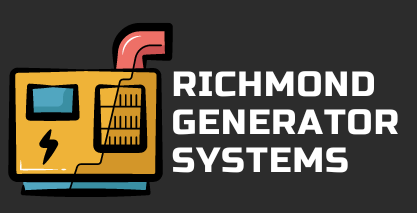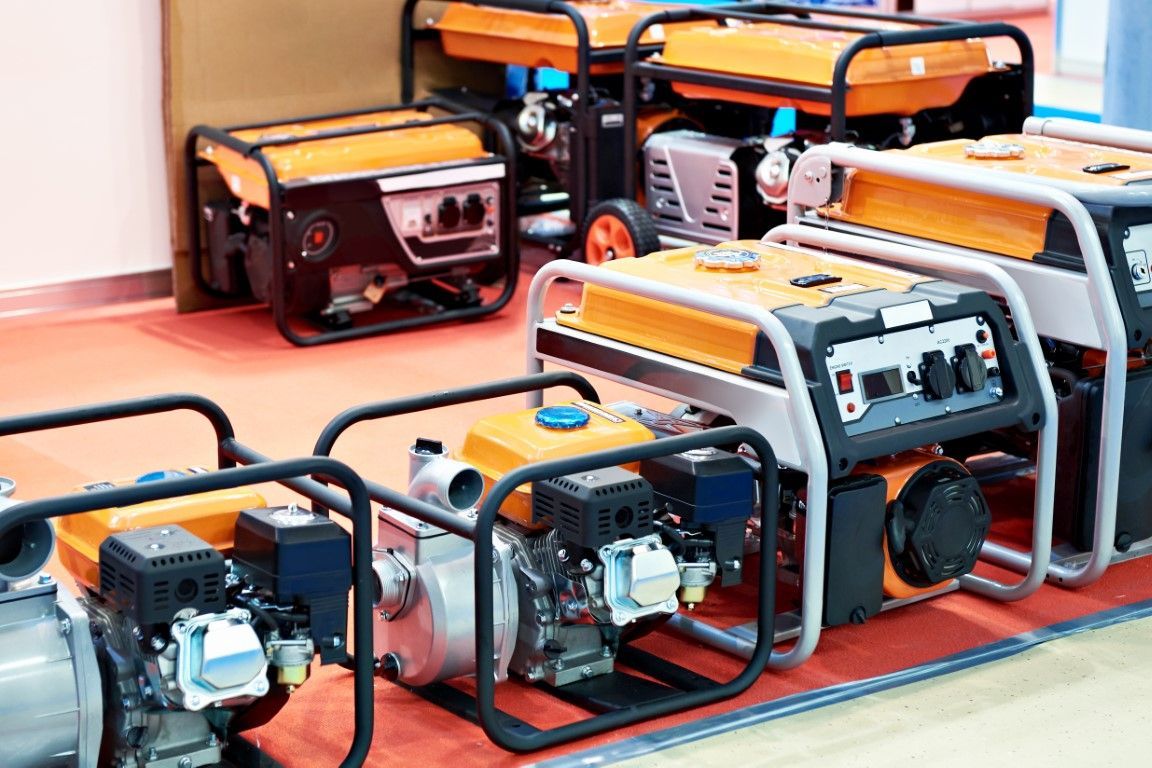
Electric Generators in Richmond VA
Electric generators are devices that convert mechanical energy into electrical energy. They work on the principle of electromagnetic induction, where a conductor is moved through a magnetic field to generate electricity. The key components of a generator include the engine, which provides the mechanical power; the alternator, which converts mechanical energy into electrical energy; the fuel system, which supplies energy to the engine; the voltage regulator, which controls the output voltage; and the cooling system, which prevents the generator from overheating.
Different Types and Key Features to Consider
Generators come in various types, each suited for different needs. Portable generators are versatile and ideal for temporary power needs, such as during outdoor events or power outages. Standby generators are more permanent solutions, designed to automatically start during power failures and supply electricity to an entire home or business. Inverter generators provide clean, stable power, making them suitable for sensitive electronics. When choosing a generator, consider features like fuel efficiency, noise level, power output, and ease of maintenance.
Regular Maintenance Tips
Maintaining your generator ensures its longevity and reliable performance. Regularly check the oil level and change it according to the manufacturer’s recommendations. Inspect and replace the air filter as needed to keep the engine running smoothly. Clean or replace the spark plugs to ensure efficient combustion. Additionally, check the fuel system for leaks and ensure the fuel is fresh. Running the generator periodically, even when not in use, helps keep the engine in good condition and prevents issues from arising.

We will get back to you as soon as possible.
Please try again later.
Safety Precautions
Safety is crucial when operating a generator. Always place the generator outdoors in a well-ventilated area to avoid carbon monoxide buildup. Keep it away from combustible materials and ensure it's on a stable, level surface. Never operate a generator in wet conditions, as this increases the risk of electric shock. Use heavy-duty extension cords rated for outdoor use to connect devices. Additionally, never refuel the generator while it is running or still hot to avoid fire hazards.
Fuel Types and Efficiency
Generators can run on various types of fuel, including gasoline, diesel, natural gas, and propane. Gasoline is commonly used for portable generators due to its availability and lower cost. Diesel generators are known for their durability and efficiency, making them suitable for larger applications. Natural gas and propane generators are often used for standby power due to their cleaner burning properties and lower emissions. Efficiency varies by fuel type and generator design, so consider your power needs and fuel availability when choosing a generator.
Applications of Portable Generators
Portable generators are incredibly versatile and can be used in various applications. They are often employed during power outages to keep essential appliances running, such as refrigerators and medical equipment. Outdoor enthusiasts use them for camping or tailgating to power lights, cooking appliances, and other equipment. Construction sites benefit from portable generators for powering tools and machinery. Their ability to provide electricity in remote or off-grid locations makes them a valuable asset for numerous activities.
Choosing the Right Generator
Selecting the right generator involves assessing your power requirements and intended use. Calculate the total wattage needed for your appliances and equipment to ensure the generator you choose can handle the load. Consider the runtime of the generator and how long you may need it to operate continuously. Evaluate additional features such as portability, ease of operation, and noise levels. Consulting with a professional or visiting a local dealer can help you make an informed decision based on your specific needs.
Importance of Electric Generators in Various Applications
Electric generators play a crucial role in various settings. In residential areas, they provide backup power during outages, ensuring that homes remain functional and safe. For businesses, generators are vital for maintaining operations and protecting sensitive equipment from power disruptions. In emergency situations, generators support healthcare facilities and disaster response teams by supplying essential power. They also support critical infrastructure like telecommunications and transportation systems, highlighting their importance in maintaining stability and functionality across different sectors.
If you need assistance with
electric generators in Richmond, VA, don’t hesitate to reach out. Our team of experts is here to help you select the right generator for your needs, provide maintenance services, and ensure your generator operates safely and efficiently. Contact us today to learn more about our services and how we can assist you with all your generator needs.
How to Prepare Your Electric Generator for Seasonal Changes
As the seasons change, it's crucial to ensure your electric generator is ready to perform reliably when you need it most. Whether it's the sweltering heat of summer or the biting cold of winter, a well-maintained generator can provide peace of mind during power outages. In this guide, we’ll walk you through the steps to prepare your generator for seasonal changes, ensuring it's in top shape for any weather conditions.

Inspect and Clean the Generator
Before the new season arrives, take the time to thoroughly inspect and clean your generator. Start by turning off the power and disconnecting the unit from any power source. Remove any debris, leaves, or dirt that may have accumulated around the generator. Use a soft brush or a vacuum to clean the exterior, paying special attention to air vents and filters. A clean generator operates more efficiently and is less likely to overheat.
Check the Fuel System
The fuel system is a critical component of your generator. For gasoline generators, check the fuel level and add fresh fuel if needed. Gasoline can degrade over time, so it's important to use fuel stabilizers to prevent issues. For diesel generators, ensure the fuel tank is full and inspect the fuel lines for any leaks or damage. Replace the fuel filter if it's clogged or dirty.
Examine the Oil Levels
Regularly checking and changing the oil is essential for keeping your generator running smoothly. Refer to the manufacturer’s recommendations for the appropriate oil type and change intervals. Before the season changes, check the oil level and top it up if necessary. If the oil appears dirty or contaminated, replace it with fresh oil to keep the engine in optimal condition.
Test the Battery
Many generators use a battery to start the engine. Ensure the battery is fully charged and in good condition. Check the battery terminals for corrosion and clean them if needed. Test the battery’s performance by starting the generator and monitoring its response. Replace the battery if it's old or failing to avoid starting issues during emergencies.
Inspect the Air Filter
The air filter prevents dust and debris from entering the engine. A clogged air filter can reduce efficiency and performance. Check the air filter and clean or replace it as necessary. Ensure it's properly seated and that there are no gaps where dust could enter. A clean air filter helps your generator run more efficiently and extends its lifespan.
Test the Generator
Perform a test run of your generator to ensure it starts and operates smoothly. Let it run for a few minutes under load to simulate actual operating conditions. Listen for any unusual noises and check for any leaks or vibrations. Testing your generator before you actually need it helps identify potential issues early and ensures it's ready when an outage occurs.
Schedule Professional Maintenance
For thorough maintenance and to address any issues you may not be able to handle yourself, consider scheduling a professional inspection. A technician can perform a detailed checkup, including internal components, and ensure your generator meets safety standards. Regular professional maintenance can help prevent costly repairs and extend the life of your generator.
Prepare for Extreme Weather
Different seasons come with their own weather challenges. For winter, ensure your generator is protected from snow and ice. A weatherproof cover can help shield it from the elements. In hot summer months, ensure there's adequate ventilation around the generator to prevent overheating. Prepare your generator according to the specific weather conditions of the season to keep it running smoothly.
Preparing your electric generator for seasonal changes is essential for reliable performance during power outages. By following these steps, you can ensure your generator remains in excellent condition and ready to provide power when needed. If you need assistance with generator maintenance or have any questions, don’t hesitate to contact us today. Our team of experts is here to help you with all your generator needs and ensure you’re always prepared for whatever comes your way.
Electric Generator Buying Guide: What to Look for in Quality and Performance
Electric generators are essential for providing power during outages or in areas without a reliable power source. Whether you're considering a generator for your home, business, or recreational use, selecting the right model involves understanding various factors that impact both its quality and performance. When it comes to choosing an electric generator, several critical factors will influence its quality and performance. Here's what you should focus on:
Power Output and Capacity
The first step in choosing a generator is determining the power output you need. Generators are rated in watts, and you should select a model that provides sufficient power for your requirements. Consider both running watts (the continuous power the generator provides) and surge watts (the temporary power required to start appliances). Assess your power needs by listing the devices and appliances you plan to run simultaneously, and choose a generator with a capacity that meets or exceeds these needs.
Fuel Type and Efficiency
Generators can run on various types of fuel, including gasoline, diesel, propane, and natural gas. Each fuel type has its advantages and disadvantages. Gasoline generators are common and often more affordable, but they can be less efficient and require frequent refueling. Diesel generators are more fuel-efficient and durable but may be noisier and more expensive. Propane and natural gas generators offer cleaner burning and can be more convenient for long-term use. Choose a fuel type that aligns with your availability, budget, and efficiency needs.
Runtime and Tank Size
The runtime of a generator refers to how long it can operate on a single tank of fuel. This factor is crucial if you need extended power supply during outages. Larger tanks typically provide longer runtimes, but the generator's fuel efficiency also plays a role. Consider how often you want to refuel and choose a generator with a tank size and runtime that suits your needs.
Noise Level
Generators can produce varying levels of noise, which can be a significant consideration depending on your environment. Noise levels are measured in decibels (dB), and quieter models are available for residential use. If noise is a concern, look for generators designed with noise-reducing features or those that operate at lower decibel levels. This will ensure you have a generator that provides power without disturbing your surroundings.
Portability and Size
Depending on where and how you plan to use your generator, portability and size might be important factors. Portable generators are ideal for camping, outdoor events, or small-scale use. They come with features like wheels and handles for easy transport. For stationary use, such as backup power for a home, you might opt for a larger, more permanent setup. Assess the space where the generator will be stored and used to determine the appropriate size and portability features.
Ease of Maintenance and Operation
A good generator should be easy to maintain and operate. Look for models with user-friendly controls, clear instructions, and accessible maintenance points. Regular maintenance, such as oil changes and filter replacements, is crucial for the longevity of the generator. Some generators come with features like automatic voltage regulation and low-oil shutdown, which can simplify operation and enhance reliability.
Safety Features
Safety is paramount when operating a generator. Choose models with essential safety features such as automatic shutoff mechanisms, circuit breakers, and CO (carbon monoxide) detectors. These features help prevent accidents and ensure the safe use of the generator. Always follow the manufacturer’s guidelines for safe operation and installation.
Brand Reputation and Warranty
Researching the brand and checking customer reviews can provide insights into the reliability and performance of the generator. Established brands often offer better quality and customer support. Additionally, consider the warranty provided with the generator. A good warranty can protect your investment and offer peace of mind in case of any issues.
Selecting the right electric generator involves evaluating your power needs, fuel preferences, and other key factors. If you need further assistance or have specific questions about which generator is best for you, our team is here to help. Contact us today to discuss your requirements and find the perfect generator solution for your needs.
Let's Connect!
Looking for reliable power solutions? Look no further than us! Our expert team is here to help you understand how whole house generators work and why they're essential. Don't get caught in the dark! Check out our buyer's guide and discover the reasons for the loss of power. Contact us today for a consultation!